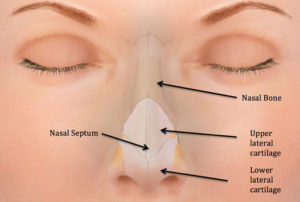Nasal SeptUM Thematom
- Overview, Causes, & Risk Factors
A hematoma is a collection of blood that occurs in tissue that separates 2 similar structures. A hematoma of the NASAL SEPTUM refers to blood in the wall separating the 2 nostrils of the nose.
- What is going on in the body?

Septal hematoma of the nose is a swelling or collection of blood, usually clotted blood, that occurs in the wall that separates the nostrils. It can be the result of trauma, bleeding disorders, disease, or drug use.
- What are the causes and risks of the disease?
- Most hematomas of the nasal septum occur as a result of trauma from being punched or hit in the nose. Other causes include:
- Collagen vascular diseases, which are disorders that cause weak arteries and thus easy bleeding
- Excessive nose picking
- Narsh nose blowing
- Medications that are used as anticoagulants, making blood less likely to clot
- History of drug use where the drug is “snorted” through the nose.
- Tumors
- Symptoms & Signs.
- What are the signs and symptoms of the disease?.
- Pain
- Swelling
- Discoloration, Redness, or Bruising
- Bleeding that oozes from the nose
- Black eyes
- Headache
- Associated fractures to the nose or to facial structures
- Diagnosis & Tests
- How is the disease diagnosed?
A healthcare provider can diagnose hematomas of the nasal septum by looking at the nose. Sometimes x-rays are done to view the nasal bones and facial structures to make sure there are no fractures. Cranial CT scans and cranial MRI scans can detect more serious injuries. If a person is on medication, blood tests will be done to check the ability of the blood to clot. A complete blood cell count, or CBC, will often be ordered to check for anemia, or a low red blood cell count.
- Prevention & Expectations
- What can be done to prevent the disease?
Sports safety guidelines for children, adolescents, and adults can prevent some injuries that lead to septal hematoma. Avoiding use of illegal drugs can eliminate hematomas caused by snorting. A person who is taking anticoagulants should have routine blood tests to check the ability of the blood to clot.
- What are the long-term effects of the disease?
Some of the long-term effects of hematomas of the nasal septum include decay of the septum, which would put a hole in the septum, and anemia from blood loss. A hole in the nasal septum allows air to pass from side to side within the nostrils. Most people, however, have no problems once the hematoma has gone away.
- What are the risks to others?
Hematomas of the nasal septum are not contagious and cannot be spread from person to person.
- Treatment & Monitoring
- What are treatments for the disease?
Treatment of hematomas of the nasal septum includes monitoring the hematoma and use of ice packs and nonsteroidal anti-inflammatory drugs (NSAIDs). Sometimes a change in medication may be necessary to prevent or decrease the likelihood of bleeding. Some people require surgery to remove the hematoma and repair any damage to the nasal septum.
- What are the side effects of the treatments?
Surgery carries a risk of bleeding, infection, and allergic reaction to anesthesia. The medications used, especially NSAIDs, can increase stomach irritation with bleeding and stomach upset.
- What happens after treatment for the disease?
Potential complications of treatment include disfigurement and difficulty breathing. Activity after recovering from surgery will usually be what the person can tolerate. Often a person will have gauze packing in the nose to decrease bleeding.
- How is the disease monitored?
Any new or worsening symptoms should be reported to the healthcare provider.


